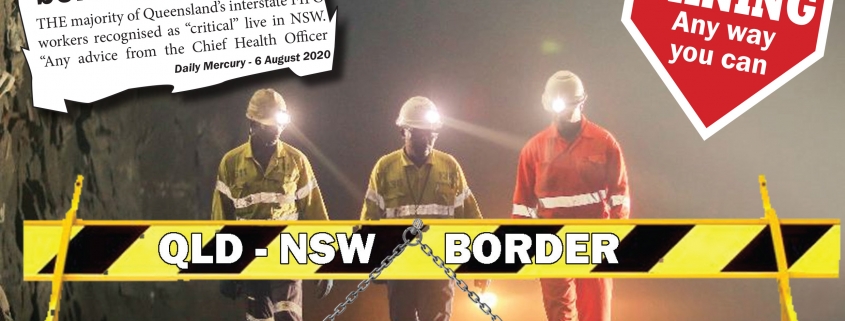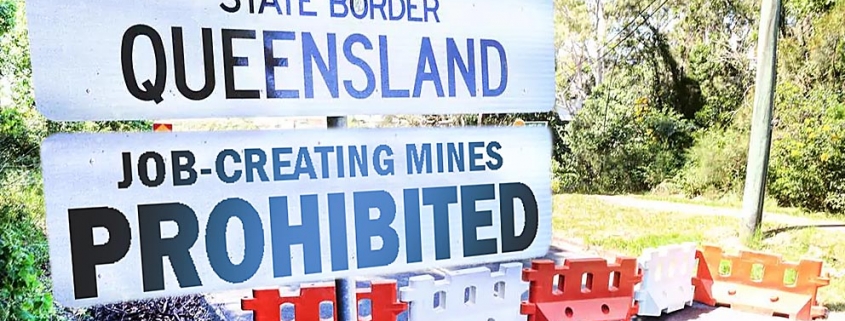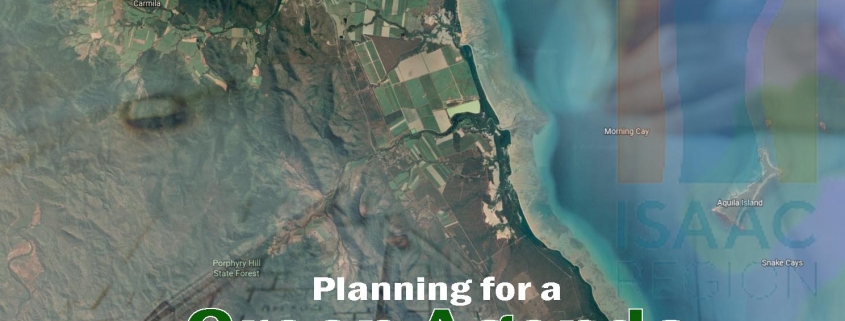While the Queensland Government is busy tilting at windmills and pouring money into “green” energy, it is failing to take advantage of a gold mine in royalties right under its nose. Mount Morgan’s gold mine could pull Queensland and Australia out of debt for a third time as the State looks for a post-COVID economic recovery.
Labor’s Minister for Mines and Energy yesterday found the time to spruik the 15 ongoing jobs to come from a billion dollar wind farm investment, but he couldn’t find the time for a meeting about Mount Morgan. I have been urgently seeking State Government support for fixing the environmental hangover from previous mines while kickstarting a new era for Mount Morgan and Queensland.
Private enterprise is already prepared to stump up $50 million for the first stage of fixing environmental issues caused by past mining practices and we desperately need the State Government to match that commitment. In the process of restarting production of gold in one of the most historic mines in Australia, the current lease-holders can fix a looming environmental disaster. The Government’s approach to handling the toxic waste to date has only served to concentrate it and kick the can down the road. It really is incumbent on the government to finally fix the problem caused by the very mining practices that dragged Queensland out of debt in the past. As yet, the Minister for Mining in Queensland has not agreed to a meeting to discuss the proposal.
Re-opening the mine site for processing gold would create direct and indirect jobs in the town but it would also be a tremendous boost to tourism in the region and across Queensland. There is a big difference between visiting an historic gold mine and visiting an historic gold mine that is still in operation. Mount Morgan has so much to offer tourists already but not many people are aware of the history and the important role the town has played in creating the country we see today. It’s fair to say Mount Morgan could become a key destination for tourism in Queensland but it can’t happen if the State Government doesn’t realise the potential.
The economic benefits for the State could be substantial and that was exactly what is needed in a post-COVID economy. COVID-19 has dealt a devastating blow to our economy and if we are going to get back on track we need to focus on the things that will KickStart Queensland with new and expanding industry and job creation wherever possible. The Queensland Government stands to gain an enormous amount from royalties they will receive from every ounce of gold coming out of the mine and there is a lot of gold left in Mount Morgan.
When Queensland’s sudden border closure locks out miners and puts Queensland mines in danger of having to close, you’ve got to wonder if it simply wasn’t thought through or if it was a deliberate swipe at the mining industry. If key workers can’t go to work (or be replaced at short notice), no one can go to work. We know Labor is planning for the closure of coal mines so it’s a valid question to ask. It’s not like the Labor Party is against NSW FIFO workers coming into Queensland to work. After all, it was Labor that issued the approval for Bowen Basin coal mines to employ a 100% FIFO workforce in the first place.
Closing Queensland’s border to key mineworkers at such short notice could have a devastating impact on the State’s economy. And yet tonight’s closure of Queensland’s border looks set to strand FIFO mine workers from interstate. If so, this would be a massive blow to Queensland’s mining industry, which has been widely touted as Queensland’s best hope for a fast economic recovery Post-COVID.
We need urgent clarity from the Queensland Government on this issue. The mining industry is heavily reliant on FIFO workers and if hundreds of these workers are to be barred from entering Queensland it is going to make it very difficult for some of them to operate. Mining, along with agriculture, is crucial to Queensland’s economy, and the government should be doing everything possible to protect it. Arbitrary actions like this border closure that imposes blanket restrictions with almost no notice, could seriously jeopardise the industry’s viability.
The Australian Minerals Council, who represents the nation’s largest mining enterprises, also criticised the move. According to the AMC, the suddenness of the border closure notice had given Queensland miners no time to work out how they will staff their mines properly without the large number of FIFO workers they normally employ.
The Queensland mining sector had one of the best Covid-19 safety frameworks in the country. Their record for keeping mine workers, their families and local communities safe has been exemplary. That’s why I’m calling on the Premier to immediately issue an exemption for FIFO mine workers or risk doing enormous damage to the sector – a sector that has contributed huge amounts of money in royalties to the Queensland Treasury over recent years.
Both major parties, the LNP and the Labor Party, waived through new laws in Queensland Parliament this week that will digitise the personal details, including identification photos and signatures, and make the information available to a variety of government and non-government organisations. And the process will be undertaken by a foreign-owned company.
Most Queenslanders would be very concerned about that, which is probably why the facts were buried in the legislation’s explanatory notes and glossed over by LNP and Labor speakers. It was, however, exposed by State Member for Mirani, Stephen Andrew:
Speech on the Transport Legislation (Road Safety, Technology and Other Matters Amendment Bill)
14 July 2020
I want to confine my comments today to another area of the bill, the implementation and operation of a digital licence app in Queensland.
The fact is that I do not think the government is being at all transparent in relation to this new app scheme or its real purpose. The app is described in the explanatory notes as little more than a matter of public utility for the general convenience and welfare of Queenslanders. The notes further reassure us that the current bill’s power to keep and use information will be exercised in limited circumstances only and states on page 21 that information shared under part 5 of the bill will not include a digital photo or digitised signature. A careful reading of the relevant sections of the bill, however, show just the opposite will be the case.
The issue of what information is shared with outside parties will be dealt with by the provisions of the Photo Identification Card Act 2008, which the current bill amends. Under the provisions of the newly amended Photo Identification Card Act, the chief executive will be authorised to retain and release information obtained through the digital licence app.
Moreover, under the amended Photo Identification Card Act’s definition, information is inclusive of a digital photo and digitised signature. The explanatory notes reassurances on this point are highly misleading. This lack of transparency can hardly be accidental since the Commonwealth government recently revealed that the Queensland government has already undertaken to share the new digital licence app’s photos and information.
In answer to a question in senate estimates last month, the Department of Home Affairs confirmed Queensland had fully committed to the uploading of digital licence app data to the National Driver Licence Facial Recognition Solution, NDLFRS. The current driver’s licence system lacks the high-definition facial imaging required for the Commonwealth’s new NDLFRS system.
The new digital licence app, however, solves this problem. This is the real purpose of the new app. The app’s high definition facial imaging data will be shared with the Commonwealth government and the biometric templates created from these images stored indefinitely.
Ultimately the plan is to allow law enforcement, intelligence agencies and even NGOs to share and access Australian citizens’ identity information in real time. I am also concerned with a comment in the explanatory notes that says the new app will initially include digital driver’s licences, photo identification cards and recreational licences.
That word ‘initially’ bothers me a lot. Exactly what other information is the government planning to include under this system? Health information? Tax and Insurance information? DNA data? The list of possibilities is endless and none of them very good.
Another question I have is: Why is the app being designed in partnership with a foreign-owned global military-industrial company with close ties to the US military, NASA and military grade hardware companies like Raytheon?
Thales is a company that not only boasts close ties with the US Army, US Navy, US Pacific Command and NATO, but one which describes itself as a leading provider of combat management systems and electronic warfare. According to its website, the Norwegian owned Thales leads the world in surveillance, detection and intelligence systems. Its motto is ‘Whatever it takes’—as long as it is not taking our privacy. That is not a very comforting resume for a non-state party being given unparalleled access and control to the sensitive biometric data of all Queenslanders.
That brings up the other situation in a digital world of being hacked and the situation of being open to be hacked. We put a lot of effort and time into our digital processes and there is always that situation. This bill relates to a whole area of governance that is rife with known and unknown risks to the citizen and about which there is a distinct lack of transparency or legislated control provisions. In a speech to the UN last year, the British Prime Minister warned about the dangers we face with new technologies of surveillance and control. He concluded his speech by saying that digital authoritarianism has become an emerging reality and unless we ensure that new technology reflects human rights and democratic freedoms, the Universal Declaration of Human Rights will mean nothing.
In Queensland we urgently need increased oversight and regulation by independent statutory commissioners, particularly around the areas of consent, retention, sharing and use of people’s biometric information. Until that happens, all bills like this should be rejected.
ALMOST a million Australians are unemployed but the Queensland government can’t rouse itself to fast-track approving the only potential large-scale job creation in Australia: new Queensland mines. Official June figures, released today, show the highest jobless percentage (7.4 per cent) since recorded statistics began In 1998. The 992,000 people now unemployed was an increase of 69,000 on figures for May.
Now is the time to KickStart the Queensland economy by taking advantage of our best performing industries. Any government that refuses to fast-track large-scale jobs, in the worst recession in a century, is just suicidal. By refusing to extend coal-mining in Queensland, the Labor government is effectively throwing extra hundreds of miners onto the dole.
Several Central and North Queensland coal mines are not at peak production. And still, whenever they have to sign the last authorisation for more coal mines, paralysis sets in. Their hands shake, and they just can’t bring themselves to do it.
The State Department has confirmed there are six coal mine applications, most listed for several years, scheduled to employ as many as 10,000 people. That kind of large scale job creation is exactly what we need and we are very fortunate, in Queensland, to have the means to do it. This is urgent. The government has to authorise these new mines. And it has to do it soon.
The Isaac Regional Council is taking final submissions on its new planning scheme (submissions close on 20 July 2020). As the State Member for Mirani, I am making the below submission and I publish it here so you can see what my feedback on the scheme and, if you wish, you can copy and paste (make any edits you wish) and make a submission yourself. They just need to be emailed to records@isaac.qld.gov.au by 5pm on Monday, 20 July 2020.
Office of the Mayor
Isaac Regional Council
PO Box 94
MORANBAH QLD 4744
Dear Cr Baker,
RE: SUBMISSION TO THE ISAAC REGIONAL COUNCIL
PROPOSED NEW PLANNING SCHEME
What is being proposed by the Council amounts to little more than a policy of “planned retreat” that will ultimately see the relocation of human habitation out of coastal, rural and forest areas and into sustainable, affordable, communal, urban ‘live where you work’ hubs that virtually every Environmental Minister since 1990 has advocated and legislated for in this State.
No shacks on the beach, no sole occupancy detached dwellings, no family homes, no backyards, no pets and definitely no living in the hills or bush or by a stream in your old age. Just communal living in low rise unit developments everywhere, with as small a ‘human footprint’ as they can get away with forcing on us.
The proposed changes to Planning contained in the new scheme are part and parcel of an ongoing program of transformative and radical change through the use of stealth and incrementalism. A program that is being carried out in Australia at a Federal, State and Local level. It relies on the strategic presumption that small changes brought in gradually will not provoke community protest action or media attention until it is too late.
The introduction of four new hazard zone mapping overlays for coast, fire, dust and flood will have a devastating impact on the Isaac Region’s economy and its capacity for future growth. For landholders, the adverse impacts will be many, ranging from growing restrictions on access and uses of land in the region, to other issues around insurance and legal liability, increased costs and an overall reduction in property and resale value.
These mapping overlays have been shown to be excessively broad in their zoning designations and through Public consultation meetings at Clairview, Stephen Andrew State Member for Mirani was informed by the presenting Cardno Engineers the mapping overlays were in error by 48% (They were only half right).
The Member also requested information at that meeting, concerning what an increased compliment of renewables/reduction of current emissions would have on the predictive water rises and was afforded no answers..
So renewable implementation has not been taken into consideration, why not? Greenhous Gas emissions are supposed to be central to Climate Change temperatures and therefore directly related to Sea Level Rise predictions, which suggests these predictions are built on fiction, not hard facts.
Under these overlays, and Government’s propensity for expanding their boundaries, almost every property in the Region will ultimately be at risk of inclusion in the new Hazard zones. This means every resident of the Isaac Region should be concerned with the direction this scheme is going in. At this rate, we are going to see a complete lockdown of the bush and coast, with many areas highly regulated and taxed, and others completely restricted and off limits.
The new Scheme is neither proportionate or democratic in response to the various inflated ‘climate change’ risk assessments contained in the mapping overlays.
In fact, the erosion of Farmers’ Property Rights as a result of the State’s Vegetation Management laws will look like ‘child’s play’ compared to what will happen should these draconian changes be passed.
Common law ‘property rights’ as we and our forefathers understood them will be rendered meaningless. At this rate, owning a property will become so loaded down with restrictions and additional costs that there will be no incentive or reason to own property anymore.
The whole idea of a democracy is that you elect representatives who will follow the public’s lead on what is right for the country and their region, but this isn’t what we’re seeing in Queensland anymore. In the case of this new Planning Scheme, the people of Isaac Region are no longer telling their public officials what they want or need done, they are being told what their public officials want done and how. All to further a collectivist Green Agenda, bent on revolutionising land access, use and management in Queensland, whether Queenslanders like it or not.
I ask that the Council scrap the proposed changes to the Isaac Regional Council Planning laws for the good of the community and the State.
Yours faithfully,
Mr Stephen Andrew
Member for Mirani






